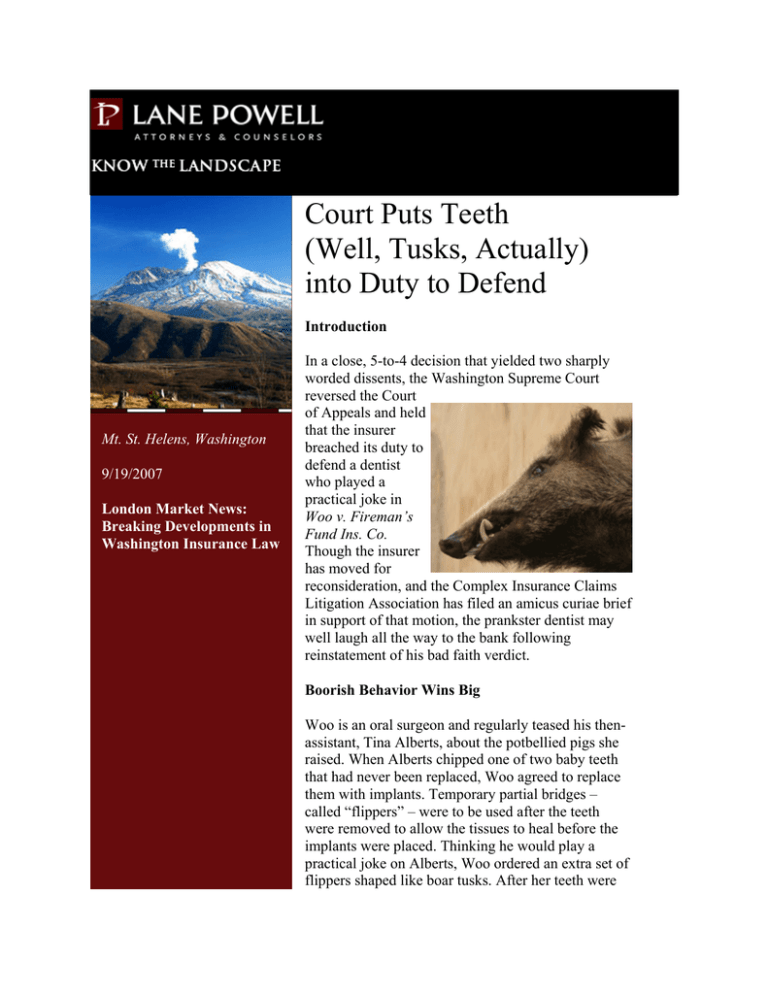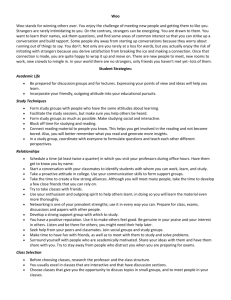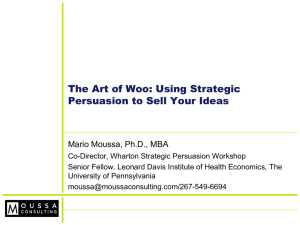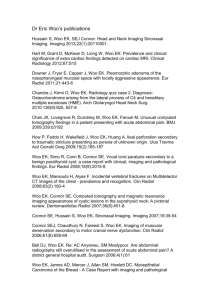Court Puts Teeth (Well, Tusks, Actually) into Duty to Defend
advertisement

Court Puts Teeth (Well, Tusks, Actually) into Duty to Defend Introduction Mt. St. Helens, Washington 9/19/2007 London Market News: Breaking Developments in Washington Insurance Law In a close, 5-to-4 decision that yielded two sharply worded dissents, the Washington Supreme Court reversed the Court of Appeals and held that the insurer breached its duty to defend a dentist who played a practical joke in Woo v. Fireman’s Fund Ins. Co. Though the insurer has moved for reconsideration, and the Complex Insurance Claims Litigation Association has filed an amicus curiae brief in support of that motion, the prankster dentist may well laugh all the way to the bank following reinstatement of his bad faith verdict. Boorish Behavior Wins Big Woo is an oral surgeon and regularly teased his thenassistant, Tina Alberts, about the potbellied pigs she raised. When Alberts chipped one of two baby teeth that had never been replaced, Woo agreed to replace them with implants. Temporary partial bridges – called “flippers” – were to be used after the teeth were removed to allow the tissues to heal before the implants were placed. Thinking he would play a practical joke on Alberts, Woo ordered an extra set of flippers shaped like boar tusks. After her teeth were removed, but while she was still under general anesthesia, Woo and his staff removed her oxygen mask, inserted the boar-tusk flippers, pried her eyes open and took pictures. Woo then removed the boartusk flippers, placed the normal flippers and completed the procedure. When Alberts later saw the photos, she sued. Woo tendered the complaint to Fireman’s Fund, which declined to defend after investigating the tender and obtaining a coverage opinion. Woo brought a bad faith action against his insurer, and settled the Alberts’ suit for $250,000. The trial court in the coverage action found on summary judgment that Fireman’s Fund had breached its duty to defend under three distinct coverages: the Professional Liability, General Liability and Employment Practices coverages. After a jury found that breach to have been in bad faith and awarded Woo three times what he paid Alberts, the insurer appealed. The Court of Appeals reversed the summary judgment, finding there had been no duty to defend Woo’s intentional, non-business activity; that the damages of which Alberts complained did not result from the “rendering of dental services” as no conceivably legitimate course of dental treatment includes boar tusks; and that there is no wrongful termination tort based on boorish behavior. Woo petitioned the Washington Supreme Court for review and it granted that request. “Conceivably Covered” and the Policy Language The Washington Supreme Court held that Fireman’s Fund had a duty to defend Woo under two coverages, (1) the Professional Liability coverage, and (2) the General Liability coverage. The Professional Liability coverage paid for all “damages that result from the rendering or failure to render dental services.” “Dental services” were defined in the policy as “all services which are performed in the practice of dentistry as defined in the business and professional codes of the state where you practice.” The Supreme Court noted that 2 Washington’s code defines the practice of dentistry as including the ownership, maintenance or operation of an office for the practice of dentistry, and concluded that the insertion of the boar’s tusks was “conceivably covered,” as the joke happened in Woo’s office and was performed on an employee. The Commercial Liability coverage applied to bodily injury caused by an occurrence. The policy defined “occurrence” as an “accident,” which was, in turn, defined as a “fortuitous circumstance, event or happening that takes place and is neither expected nor intended from the standpoint of the insured.” The policy definition did not include “injury” within the expected or intended clause, and the complaint alleged only intentional conduct. Nevertheless, the Supreme Court held that because the complaint was not clear as to whether Woo had specifically intended that his intentional actions would result in the emotional distress Alberts suffered, the insurer had a duty to defend. The Commercial Liability coverage also applied to personal injury if the personal injury was caused by an offense “arising out of your business.” “Offense” was defined in the policy as a “fortuitous, inadvertent or mistaken business activity giving rise to advertising injury or personal injury neither expected nor intended from the standpoint of the insured.” The Court judged the phrase “arising out of your business” to be very broad and found a duty to defend under this coverage provision as well. Need for “On-Point” Case Law Before declining the defense, the insurer had obtained a coverage opinion that analogized the Alberts complaint to two other cases. In one of those cases a dentist had fondled his patient’s breasts while she was under anesthesia and the reviewing court held there was no duty to defend or indemnify because sexual assault of a sedated patient could never be part of a legitimate dental treatment program. Here, the coverage opinion concluded that a finder of fact would not find Woo’s conduct to be “dental services,” but that “there is always a chance” a reviewing court 3 would hold these cases pertain only to sexual misconduct. Indeed, the Supreme Court so held. It further held that because there was no allegation of sexual assault in Woo, the cases relied upon were not directly on point, and Fireman’s Fund had a duty to defend in the face of “equivocal interpretation of case law.” Members Of Our London Client Team Seattle: • Gabe Baker - bakerg@lanepowell.com • Mark Beard - beardm@lanepowell.com • Stanton Beck - becks@lanepowell.com • John Devlin - devlinj@lanepowell.com • Larry Gangnes - gangnesl@lanepowell.com • Dave Hunter - hunterd@lanepowell.com • Robert Israel - israelr@lanepowell.com • Steve Jensen - jensens@lanepowell.com • Mark Johnson - johnsonm@lanepowell.com • Katie Matison - matisonk@lanepowell.com • Barry Mesher - mesherb@lanepowell.com • Laura Morse - morsel@lanepowell.com • Kathleen Nelson - nelsonk@lanepowell.com • Jeffrey Odom - odomj@lanepowell.com • Benjamin Roesch - roeschb@lanepowell.com • Mary Schug - schugm@lanepowell.com • Cathy Spicer - spicerc@lanepowell.com • James Stoetzer - stoetzerj@lanepowell.com • Emilia Sweeney - sweeneye@lanepowell.com • David Young - youngd@lanepowell.com Anchorage: • Brewster Jamieson -jamiesonb@lanepowell.com Portland: • Stephen McCarthy -mccarthys@lanepowell.com • Victoria Blachly - blachlyv@lanepowell.com • Tanya Durkee - durkeet@lanepowell.com 4 London Client Team 206.223.7000 Seattle 503.778.2100 Portland LMNews@lanepowell.com www.lanepowell.com We provide London Market News as a service to our clients, colleagues and friends. It is intended to be a source of general information, not an opinion or legal advice on any specific situation, and does not create an attorney-client relationship with our readers. If you would like more information regarding whether we may assist you in any particular matter, please contact one of our lawyers, using care not to provide us any confidential information until we have notified you in writing that there are no conflicts of interest and that we have agreed to represent you on the specific matter that is the subject of your inquiry. © 2007 Lane Powell PC Seattle - Portland - Anchorage - Olympia - Tacoma London 5


